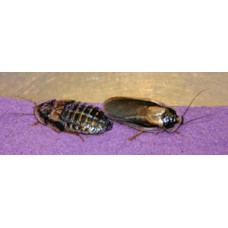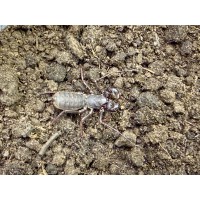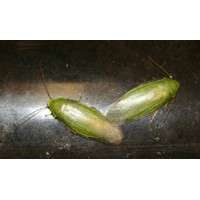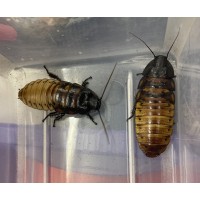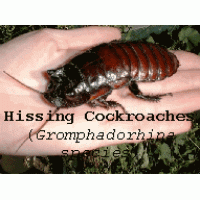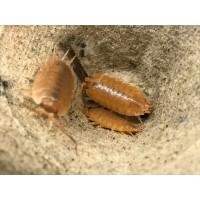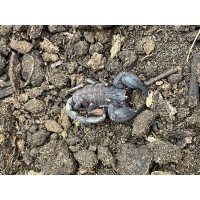April Tarantula sale! - 20% off all tarantulas on my "tarantulas" page. This is my largest discount ever!
All my tarantulas are captive bred
Just enter the code April25 when ordering.
If you place an order without the code you will be charged full price (I cannot give the discount once payment has been taken).
I need to clear stocks and get down to a level where I can carry out a comprehensive stock take of all my spiders.
Common Name: Dubia Cockroach (formally the Orange Spotted cockroach)
Scientific Name: Blaptica dubia
Size: Various - Per tub
Status: Captive Bred
Fast moving, speckled cockroaches. The female is wingless and the male is fully winged.
Easy to keep and breed.
Note : A tub of cockroaches will always contain enough individuals to start a breeding colony. The number in a tub varies depending on size of species, stage of lifecycle and how many I have in stock. (minimum 12, when I am over-run with a certain species, a tub will contain as many as I can fit in!)
Food : Cockroaches will eat a range of fruit, veg, cereals and kitchen scraps. I feed all my cockroaches on my dried 'cockroach mix' (muesli, cat biscuits, fish pellets and bran - mixed together), plus a little fruit and veg. I generally feed the cockroaches once or twice a week.
How I keep mine
I keep these and many of my other cockroaches in plastic boxes (24 litre or 32 litre, opaque, purchased from Wilko or Tesco). I make air holes in the lid with my little soldering iron, great for burning the right size holes through plastic. I use peat, coir or vermiculite on the base and add leaf litter (Oak, Beech or other hardwoods) and pieces of bark or egg trays to hide under. I am discovering more and more that many cockroaches will eat some leaf litter and seem to enjoy it but it isn't strictly necessary as I kept cockroaches successfully for many years without giving them any leaves. I feed them once or twice a week on my dried cockroach mix and pieces of fruit and vegetables. I find banana and cucumber are favourites.
I place my boxes on a shelf with a heat mat on it, I use a strip heat mat (15cm wide) and this covers part of the base of the box (several boxes can fit on one long mat). Like most bugs it is a good idea to give them a dry and a damp area to choose from. I find the area above the heat mat is dry and the area not covered by the heat mat is more moist. I use plastic boxes for my cockroaches as I have lots of species and don't have the space to keep them all in individual tanks but of course they do equally well when housed in a plastic or glass tank and are much more visible.
Some cockroaches climb much better than others. I find the Dubia can be housed without a lid and don't seem to climb out but the box or tank must be deep enough. They don't fly (the males have wings but I have never seen them attempt to fly!) and they seem to like drier conditions than some other species. Most cockroaches will not do well in stale, damp conditions as this encourages mould to grow. The Dubia cockroaches are generally the most popular live food choice for tarantulas, scorpions, mammals and reptiles (this may be due in part to the many forums that list them as a favourite food). I certainly find it difficult to breed enough to keep up with demand!
Dubia Cockroach (Blaptica dubia) Per Tub
- Product Code: 85
- Availability: 6
- £12.50
-
£2.99
Selection of Specials
Devil Vinegaroon (Thelyphonus Sp. Thai) Adult female (slightly imperfect - missing 'tail')
Common Name: Thailand Vinegaroon / Whip Scorpion Scientific Name: Thelyphonus Sp. Thai ..
£14.99
Green Banana Cockroach (Panchlora nivea) Per Tub
Common Name : Green Banana CockroachScientific Name : Panchlora niveaStatus : Captive BredThese fasc..
£9.99
Tiger Hissing Cockroach (Gromphadorhina grandidieri) Adult/Sub-adult
Common Name : Hissing Cockroach Scientific Name : Gromphadorhina grandidieri Size : Ad..
£7.50
Hissing Cockroach (Gromphadorhina species) Small nymph x 5
Common Name: Hissing Cockroach Scientific Name: Gromphadorhina species Size: Small nym..
£2.99
Spanish Giant Orange Isopod (Porcellio laevis) x 10 (medium/large)
Common Name: Spanish Giant Orange Isopod Scientific Name : Porcellio laevis Size : Medium/..
£4.99
Thai Bush Scorpion (Chaelius cimrmani) Juvenile
Common Name: Thai Bush Scorpion Scientific Name: Chaelius cimrmani Size: JuvenileStatus: ..
£9.99




